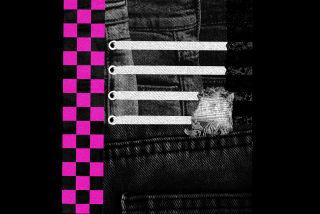Students See Stark Parallels Between Gulf Conflict, Gang Battles at Home
- Share via
The students at the Sheenway School in South-Central Los Angeles are well acquainted with the brutalities and language of war.
Their school, at the corner of Broadway and 101st Street, sits behind a locked chain-link fence, guarded by a watchdog, on turf that one Crips faction is now trying to wrest from another. Their friends have, in some cases, been killed or wounded in drive-by shootings. Their principal wears a T-shirt that says “Ex-POW”--Ex-Prisoner of Watts.
On Thursday, the children of Sheenway gathered at noon to debate another kind of war, one that is thousands of miles away in the Persian Gulf but hits home nonetheless.
Punctuated by youthful malapropisms--”Stud” missiles, “Adam” Hussein--their discussion touched on economics, loss of human life, the threat of chemical weapons, the merits of talking rather than fighting. In the end, they concluded, the war over there isn’t altogether different from the war over here.
“I think Saddam Hussein is like one of the gangs,” said 13-year-old Muhammad Lugman. “He wants more territory. He wants more land. Bush is like another gang. He wants to keep his territory.”
Why, principal Dolores Sheen wanted to know, do gangs want more territory?
“So they can sell more drugs,” one student piped up, “and try to get rich.”
Said another: “Just like oil with Saddam Hussein and President Bush.”
The debate was Sheen’s idea. She presides over Sheenway School and Culture Center, a small private institution that she and her late father founded 20 years ago after the Watts riots. Herbert Sheen and his daughter wanted a place where black children could find a good education, a haven from violence and the freedom to discover and pursue their own interests.
The school and its adjacent community center is a peaceful oasis in the midst of a turbulent community. It is attended by 50 students, preschool through high school age. The children dress in uniforms and are taught to settle their differences with their mouths, not their fists. Tuition is $260 a month, but school officials say few parents pay the full amount. Instead, the school relies mostly on donations.
When war broke out in the Persian Gulf last week, Sheen said, her students were consumed. Two girls, both with relatives serving in the military, shed tears. A couple of boys, members of the Islamic faith, discussed how the hostilities might affect their religious brethren. Arguments erupted. The children seemed on edge.
“Every day they have to be aware of going to and from home, of wearing the right colors, looking the right way, saying the right things,” Sheen said. “We have to stress all the time, ‘Use your intelligence to express yourself. Try to find a resolution without resorting to violence.’ But there is violence all around them. And this war is an act of violence.”
She arranged the debate in part for her own edification. She wanted to know how the youngsters felt.
Ten students, ranging in age from 13 to 16, participated: Five girls argued against the war and five boys argued for it. A dozen or so younger children listened in.
Their thoughts echoed those across the nation. “Many innocent lives will be taken,” declared Tanisha Thompson, 13. “How much farther will this go? It’s a shame we can’t fight the problems over here like drugs and the gangs. Instead we fight for oil, which we will not be able to use if we kill ourselves off.”
Rashad Gordon, 13, leaned forward in his seat. “Do you want a man like Saddam Hussein with nuclear power?” he asked caustically. “He’s crazy. We should stop him or he’ll become another Hitler.”
Later, Sheen ordered up some unrehearsed role playing. She called upon one set of youngsters to play Hussein, Bush and their cabinets, another set to play Bloods and Crips. The Hussein-Bush encounter ended with Bush stalking away, vowing to wage war. The Bloods-Crips exchange quickly deteriorated into a mock fistfight.
“I got a lot of gang-banger friends,” 14-year-old Abdullah Abdul-Mujeeb explained afterward. With them, he said, there is rarely negotiation over disputed territory: “It’s all or nothing.”
Another student volunteered that gang members “already got their minds set on fighting.” Sheen then asked how many students thought the same was true of Hussein and Bush.
Every hand in the classroom went up.
More to Read
Sign up for Essential California
The most important California stories and recommendations in your inbox every morning.
You may occasionally receive promotional content from the Los Angeles Times.













